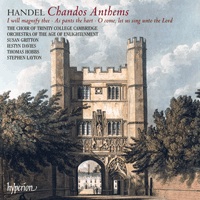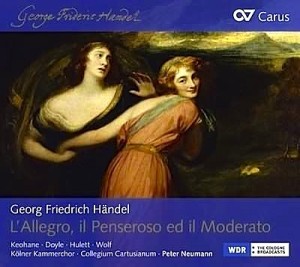
Two excellent new recordings of vocal music by Geroge Frideric Handel — his immortal Chandos Anthems and the oratorio L’Allegro, il penseroso ed il moderato — made me wonder how we would treat a 21st century Handel.
- Classical Music 101: What Does A Conductor Do? - June 17, 2019
- Classical Music 101 | What Does Period Instrument Mean? - May 6, 2019
- CLASSICAL MUSIC 101 | What Does It Mean To Be In Tune? - April 23, 2019
The German-speaking law-school dropout with a talent for writing opera arrived in England on the coattails of an unpopular German-born king (George I, the first of the Hanover monarchs, who later Anglicised themselves as Windsors) in the mid-1710s.
Handel could dash off an opera score in weeks, a concerto in mere days. Although his English remained imperfect until the day he died, he had a knack for setting the language to music. He was an astute businessman, running his own opera company and hiring Europe’s most famous singers. He endlessly recycled his music.
And when fashion turned against him, he turned himself from opera impresario to oratorio specialist.
In short, he was maddeningly versatile and impossibly successful in a field that has most people struggling financially nearly every day of their adult lives.
If he were wlive today, our academics would be deriding him for self-plagiarization. The highbrow would label his music too commercial. Symphonists would dismiss him as operatic. The arts councils would be asking him to come up with new ways of presenting opera and instrumental music rather than repeat what worked so well.
You get the picture.
We can say “greatest English composer of the 18th century” without doubting or equivocating or flinching.
Can anyone say “greatest Canadian composer of the 20th century” and not feel an involuntary twitch of, say, a leg being pulled?
Anyway, I’m digressing. As it is, Handel’s position in the Western musical pantheon is set, as it deserves to be. Hundreds stop atop his stone in Westminster Abbey for a special little moment of thanks every week. And thousands continue to perform and listen to his music every day of the year.
The two new albums that prompted this little rant are the Choir of Trinity College Cambridge and the Orchestra of the Age of Enlightenment’s recording of three Chandos Anthems for Hyperion, and a Carus recording of L’Allegro by the Cologne Chamber Choir and guests.
The first work dates from Handel’s early years, following his Italian apprenticeship. The other is from 1740, a time when the middle-aged composer had reinvented himself as an oratorio writer.
Both albums in their own way showcase his remarkable way with a melody, elegant counterpoint and knack for finding the right dramatic underpinning for any text.
 The Cambridge recording of anthems 5, 6 and 8 is a model of polish, from the first-class soloists — Susan Gritton, Iestyn Davies and Thomas Hobbs — to conductor Stephen Layton’s easy, natural-sounding pacing. The music flows in a big, long, silky continuum while still conveying a clear sense of the underlying rhythms.
The Cambridge recording of anthems 5, 6 and 8 is a model of polish, from the first-class soloists — Susan Gritton, Iestyn Davies and Thomas Hobbs — to conductor Stephen Layton’s easy, natural-sounding pacing. The music flows in a big, long, silky continuum while still conveying a clear sense of the underlying rhythms.
The audio, captured at Trinity College Chapel, is perfect — a remarkable feat in a big space with a lively acoustic where individual voices as well as groups need to be nicely balanced.
After being initially charmed, I have to admit that I prefer a bit of a rougher-hewn texture to the sound than what we get in the Chandos Anthems, settings of sacred texts which get their group nomenclature from the Earl of Carnarvon, and first Duke of Chandos, for whom Handel wrote these pieces (as well as his ever-popular pastorale, Acis and Galatea) in 1717.
You can find all the details, as well as audio samples of the album here.
 If you were one of the several thousand people seduced by Mark Morris’s dance-ified L’Allegro at this year’s Luminato festival, the new recording led by German conductor Peter Neumann, made at the Church of the Trinity in Cologne, is absolutely worth picking up.
If you were one of the several thousand people seduced by Mark Morris’s dance-ified L’Allegro at this year’s Luminato festival, the new recording led by German conductor Peter Neumann, made at the Church of the Trinity in Cologne, is absolutely worth picking up.
Here are two hours of Handel’s finest arias, choruses and instrumental interludes rendered by vocal and orchestral forces (the period-instrument Collegium Cartusianum) as fine as what we would get from Tafelmusik.
This is technically challenging music rendered as if were a romp, making this two-CD album is a big smile from beginning to end. And the booklet includes the libretto.
You can check out the details here.
+++
There is an excellent website devoted to G.F. Handel celebrating its first anniversary. The place includes everything from basic biographical data to compilations of the latest editions of his scores, academic research and books. You’ll find it here.
+++
Here is a little snippet of Handel’s early Brockes Passion (1712) featuring Neumann, the Cologne Chamber Choir and the Collegium Cartusianum:
John Terauds
- Classical Music 101: What Does A Conductor Do? - June 17, 2019
- Classical Music 101 | What Does Period Instrument Mean? - May 6, 2019
- CLASSICAL MUSIC 101 | What Does It Mean To Be In Tune? - April 23, 2019



